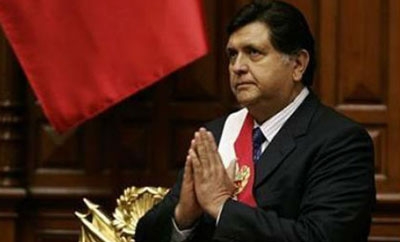An investigation in Peru has exposed the pardoning of an entire drug trafficking ring, expanding the probe into allegations that members of President Alan Garcia’s administration took bribes to lower sentences.
The group, which sold and trafficked heroin and cocaine in the country’s northern Cajamarca region, was broken up by Peruvian police between 1999 and 2002, and handed stiff sentences. However, in 2009 their sentences were reduced, and they were released, reported La Republica.
The commuted sentences were exposed after El Cuarto Poder television news program showed a 2009 jail visit by Aurelio Pastor, the justice minister at the time, in which he is seen talking to some of the group. The video is hardly conclusive but shows Pastor jovially speaking to the prisoners about whether they have been “good” during their time in jail.
The timing of the visit was auspicious for the prisoners. Sentences were dropped, with the final approval coming from President Garcia himself, in the months that followed.
InSight Crime Analysis
Garcia has a history of close brushes with corruption inquiries. His first presidency (1985 – 1990) faced numerous charges of corruption, all of which were dismissed or archived. He is also being probed now because of a beautiful, multimillion dollar Lima-based home he purchased.
The so-called “pay-for-pardons” scandal started earlier this year when it emerged 400 drug traffickers were among 5,500 people pardoned during his 2006-2011 term. Garcia subsequently claimed the only drug traffickers released were low-level criminals and their release was intended to ease prison overcrowding, something that is becoming common worldwide, including in the United States. And Garcia has said that these probes are political, since two-time president appears to be revving up for a third run at the presidency in 2016.
However, evidence is mounting. A convicted trafficker who became a Drug Enforcement Administration (DEA) informant subsequently claimed he was quoted a fee of $150,000 to reduce his sentence from 25 to 15 years. While APRA refuted those claims, the subsequent recapture of 85 of the 400 released traffickers, after they were found to have re-entered the drug trade, some at a high level, has cast doubt over claims regarding their low criminal status.

